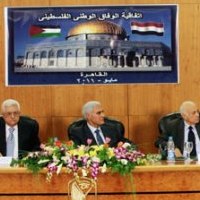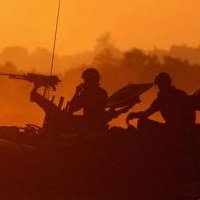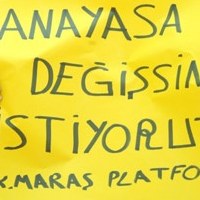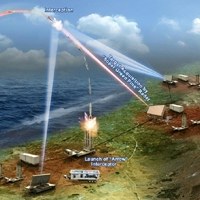![]()
Tue, Nov 15, 2011 | WikiLeaks

Human rights NGO B'tselem director Jessica Montell during a meeting with Munich-American Peace Committee members in Israel, Oct. 17 - Oct. 28, 2006. (Source: http://www.palis-d.de/archive/text/06Bethlehem.html)
WikiLeaks: U.S. Discusses Goldstone Report with Israeli Human Rights Activists, Red Cross, Academic and Legal Experts
DOn the margins of his meetings with Israeli military commanders and officials Michael Posner also met with several non-governmental interlocutors regarding the Israeli response to the Goldstone Report. Most advocated that the GOI do more to address the report directly and publicly, with the human rights NGOs calling for extensive investigations resulting in criminal prosecutions, while the ICRC, academic, and legal experts welcomed ongoing IDF investigations but called for more forward-looking GOI policy and doctrinal changes.
Source: WikiLeaks
Reference Created Classification Origin 10TELAVIV184 2010-01-27 09:47 CONFIDENTIAL Embassy Tel Aviv
VZCZCXRO9073
OO RUEHROV
DE RUEHTV #0184/01 0270947
ZNY CCCCC ZZH
O 270947Z JAN 10
FM AMEMBASSY TEL AVIV
TO RUEHC/SECSTATE WASHDC IMMEDIATE 5171
INFO RUEHXK/ARAB ISRAELI COLLECTIVE PRIORITY
RUEHAM/AMEMBASSY AMMAN PRIORITY 7188
RUEHEG/AMEMBASSY CAIRO PRIORITY 5305
RUEHJM/AMCONSUL JERUSALEM PRIORITY 3609
RUEHGV/USMISSION GENEVA PRIORITY 0666
RHEHNSC/NSC WASHDC PRIORITY
RUCNDT/USMISSION USUN NEW YORK PRIORITY 9712C O N F I D E N T I A L SECTION 01 OF 04 TEL AVIV 000184
SIPDIS
E.O. 12958: DECL: 01/26/2020
TAGS: PREL PHUM KWBG PTER IS
SUBJECT: A/S POSNER DISCUSSES GOLDSTONE REPORT WITH ISRAELI
NGOS, ICRC, AND LEGAL EXPERTSREF: A. A) TEL AVIV 183
¶B. B) TEL AVIV 182
¶C. C) 09 TEL AVIV 02831
¶D. D) 09 TEL AVIV 02342
¶E. E) 09 TEL AVIV 2283Classified By: Charge d’Affaires Luis G. Moreno for reasons 1.4 (b) and
(d).¶1. (C) Summary. On the margins of his meetings with Israeli
military commanders and officials (reftels A and B), DRL A/S
Michael Posner also met with several non-governmental
interlocutors regarding the Israeli response to the Goldstone
Report. Most advocated that the GOI do more to address the
report directly and publicly, with the human rights NGOs
calling for extensive investigations resulting in criminal
prosecutions, while the ICRC, academic, and legal experts
welcomed ongoing IDF investigations but called for more
forward-looking GOI policy and doctrinal changes. End summary.¶2. (C) DRL Assistant Secretary Michael Posner discussed the
Israeli response to the UN Goldstone Report with human rights
organizations, the International Committee of the Red Cross
(ICRC), UNRWA, the UN Secretariat’s Office for the
Coordination of Humanitarian Affairs (OCHA), and legal and
academic experts on the margins of his official meetings with
the GOI and IDF during the week of January 5-9. All agreed on
the need for an independent commission to review the
credibility of IDF investigations, which have not yet become
public. Several interlocutors said the government,s focus
should be primarily on identifying lessons learned from
Operation Cast Lead and ways to improve military doctrine and
wartime humanitarian coordination. The human rights NGO
representatives, however, called primarily for accountability
at the highest levels in the IDF and political leadership,
arguing that internal IDF investigations alone could not
address the main issues enflaming international opinion from
Israel’s Operation Cast Lead in the Gaza Strip last year.¶3. (C) Limor Yehuda of the Association for Civil Rights in
Israel (ACRI) argued that military police investigations
could not resolve the main issues of how Israel conducted the
military operation, including its targeting and policy
decisions. While she rejected Goldstone’s tone and claim that
Israel deliberately targeted civilians during the
hostilities, she believed only international pressure could
influence the GOI to create an independent investigation that
could hold senior leadership accountable for alleged
violations of International Humanitarian Law (IHL) during the
armed conflict. Yehuda stressed that her requests to the
Attorney General to open an independent investigation were
solely based on IHL principles of distinction and
proportionality and did not make the Goldstone Report’s
mistake of confusing IHL with Human Rights Law, as IHL is the
relevant body of law that applies in situations of armed
conflict. Yehuda was also disappointed that there was still
no Israeli public discussion of lifting the “blockade” on
Gaza, which she described as being a purely punitive measure
since Hamas’ 2007 takeover.¶4. (C) Human rights NGO B’tselem director Jessica Montell,
who had submitted 20 cases regarding Operation Cast Lead to
the Attorney General that resulted in 8-9 military
investigations, also said B,tselem would like to see changes
at senior levels of the GOI that could never be achieved by
an internal IDF investigation. She wanted the highest level
decision-makers held accountable for the decisions they made
on how to prosecute the conflict, including Military Advocate
General (MAG) Mandelblit for his role in advising on the
suitability of targeting typically civilian structures, such
as the Hamas police force, which suffered heavy losses during
the first hour of hostilities. She recognized the difficulty
of pursuing a criminal track as she believed all levels of
the IDF and GOI were involved and the public remained highly
supportive of the operation, but she at least wanted to see
prohibitions on the types of weapons used in urban
environments, such as white phosphorus and mortar shells. She
also sought greater clarity on proportionality, as there
appeared to be “no moral check on war” when Israel allegedly
dehumanized those in Gaza and “had zero tolerance for IDF
killed,” which she claimed transferred risk onto civilians in
Gaza. Her aim, she said, was to make Israel weigh world
opinion and consider whether it could “afford another
operation like this.”TEL AVIV 00000184 002 OF 004
Red Cross Awaiting Official Reply
———————————¶5. (C) A/S Posner met January 6 with ICRC Israel delegation
head Pierre Wettach, deputy Pierre Dorbes, and Legal Advisor
Cordula Droege. ICRC had submitted its own confidential
“Conduct of Hostilities” report in June 2009 to the GoI. The
report, Wettach said, addressed legal issues, operational
issues and possible IHL violations that occurred during
Operation Cast Lead. ICRC hopes to engage the IDF on legal
and operational policy issues related to these incidents,
such as proportionality, weapons use, and the distinction of
combatants from non-combatants. According to Wettach, there
were fundamental disagreements between the IDF and the ICRC
regarding distinction: for the IDF, for example, Hamas police
were a legitimate target at all times; for the ICRC, a
policeman who was not engaged in hostilities against Israel
was not a combatant. Another disagreement was the targeting
of civilian infrastructure. For the IDF, according to
Droege, open agricultural land might be a legitimate target
because at some point in the future it could be used for
firing rockets at Israel; for the ICRC, this was a highly
problematic assumption.¶6. (C) The ICRC had yet to receive an official written
response to its report, but it did have initial discussions
with the IDF, which promised serious investigations and
expanded cooperation with the ICRC. Wettach hoped that the
GoI would engage with ICRC once it had completed its response
to the Goldstone report. Wettach relayed, however, that while
they understood the GoI’s constraints, ICRC Geneva was
becoming impatient with the lack of an official reply.
(reftel C)¶7. (C) Wettach described the ICRC,s interest not in
ascribing blame for Israeli actions during Cast Lead, but to
move forward, improve field coordination, increase IHL
education and training, and further integrate IHL norms into
Israeli military doctrine and standard operating procedures.
The ICRC wanted to see fewer civilians killed and wounded in
any future conflict, which they judged would be in the not
too distant future, and to have the wounded reach hospitals
more quickly. Wettach said the Israeli response had been
positive. The IDF had acknowledged that its coordination
with the ICRC during Cast Lead could have been better. In
fact, during the operation, ICRC had no contact with the
IDF,s Southern Command, but only with the Coordinator of
Government Activities in the Territories (COGAT), a less than
ideal arrangement. A better mechanism was also needed for
operational issues such as transfer of wounded and care for
the sick during hostilities.¶8. (C) Another ICRC concern was that for the IDF, “force
protection” meant a “zero casualty” policy. Wettach
commented that the GOI position as articulated by the MFA was
that force protection was a legitimate excuse for all actions
by Israel. Wettach observed, however, that “dropping
leaflets is fine, but it doesn,t mean that once it,s done,
you can shoot at anything that moves.” The ICRC
representatives believed a key issue would be the chain of
command at the tactical level, since the IDF tendency was to
give as much latitude as far down the chain of command as
possible. (Note: On the day of this meeting, the decision by
IDF Chief of Staff Gabi Ashkenazi to move IDF legal advisors
down the chain of command to the division level was widely
reported in the Israeli press. End note.) Wettach added
that there had been two incidents during Cast Lead in which
ICRC vehicles were fired on by the IDF, which should never
have happened. Though the IDF fire did not cause any
casualties, it led to the suspension of ICRC movement in Gaza
for two days.United Nations
————–¶9. (C) A/S Posner separately met January 8 with OCHA Head of
Office Phillipe Lazzarini and UNRWA Deputy Commissioner
General Filippo Grandi. Both described contact with the GOI
as regular and mostly positive. However, they attributed the
failure of UN advocacy efforts related to Gaza and West Bank
access restrictions and protection of civilians to their low,
technical-level contact with the GOI. Grandi noted that,
when he arrived at his post four years ago, he was surprised
with “the UN’s low level of engagement” with the GOI. “Our
interlocutors are simply unable to deliver,” said UNRWA LegalTEL AVIV 00000184 003 OF 004
Advisor Anna Segall. When asked about coordination during
the Gaza conflict, both Lazzarini and Grandi said that
creation of the Humanitarian Coordination Cell had been a
positive step. However, the cell had been unable to
coordinate, or respond to, on-the-ground, real-time events
inside Gaza. For example, when Israeli artillery began
firing inside the UNRWA compound in Gaza on January 15, it
took several hours of back-and-forth communication with the
cell to stop the shelling. (Comment: In fact, Embassy Tel
Aviv and ConGen Jerusalem, working together, played a key
role in stopping the shelling. End comment.) Both OCHA and
UNRWA recommended that any future coordination mechanism
include direct contact with the operational command
structure. Lazzarini also noted the need to pre-position
adequate humanitarian supplies prior to the onset of another
conflict. Prior to Cast Lead, UNRWA’s and WFP’s food stocks
had dwindled to almost nothing due to greater-than-usual
access restrictions in November and early December 2009, he
said.Perspective of Possible Head of Commission of Inquiry
———————————¶10. (C) A/S Posner and his delegation met January 6 with
retired Supreme Court Chief Justice Aharon Barak, who along
with the prior Supreme Court Chief Justice Meir Shamgar was
often mentioned as one of the two likeliest persons to head
up an independent Israeli investigatory committee on
Operation Cast Lead, should one be established. Barak said
that he had deliberately not read the Goldstone report nor
expressed views on it. He noted that he and Goldstone were
close friends, and that he had been responsible for
introducing Goldstone,s daughter, who had lived in Israel,
to her husband, but added that he had not been in touch with
Goldstone recently. Barak had been a member of the Kahan
Commission which investigated the 1982 Sabra and Shatila
massacre.¶11. (C) Barak said that, from a legal perspective, Israel
could choose either to do nothing at all in response to the
Goldstone Report, or to create a Commission of Inquiry. A
third option existed as well, based on a special statute
which would allow the cabinet to appoint a commission to
investigate a topic of its choosing. The terms of such an
appointment could range from “check the Goldstone report” to
“see if Goldstone was right about individual cases,” or
“check if the IDF investigated properly and reached the
correct conclusions.” It would be up to the cabinet to
dictate the terms of reference. The decision to establish a
full Commission of Inquiry would be taken by the executive
branch, which would determine the number of its members
(typically three to five). It would be up to the Chief
Justice of the Supreme Court to decide who would sit on the
commission. If convened, the commission would have all the
authorities of a court to call hearings, have witnesses
represented by lawyers, etc. A typical inquiry would begin
with a criminal investigation (which would be difficult given
the time that has elapsed since Operation Cast Lead) and be
followed by court hearings. Acknowledging that he might be
named head of such a commission if one is established, he
noted that “If I don,t agree to the terms of reference,
they,ll find someone else who will.Ӧ12. (C) On the Goldstone report itself, Barak commented that
the idea that “there was a conspiracy to kill Arabs” made no
sense. He believed that the report was unfair, but observed
that there had been no organized public defense by the
Israeli government. Barak said he was surprised that
Goldstone was “running around giving interviews and comments
on his report,” and contrasted Goldstone,s actions to his
own as a member of the Kahan Commission: “we published the
report, and that was it. We didn,t say anything about it.Ӧ13. (C) Members of the delegation noted that they were trying
to get a sense of whether the GoI might want to establish a
commission and under what terms. Barak said that he did not
know, and had not been following the debate. He added that
he had not responded to anyone about the possibility of his
heading up a Commission of Inquiry, but implied that his
interest in doing so would largely depend on what the
commission,s terms of reference would be. He also noted
that “this Commission of Inquiry shouldn,t just study facts,
but provide a normative framework for the future.”Raising Academic Discourse on Asymmetrical Warfare
TEL AVIV 00000184 004 OF 004
——————————-¶14. (C) Hebrew University Professor Moshe Halbertal, who also
teaches ethics for the IDF and whose New Republic article
contributed one of the few nuanced discussions of Goldstone,
told the delegation there was much room for academics to
raise the level of discourse over Goldstone to a constructive
examination of the difficulties of asymmetrical warfare and
expressed personal interest in being involved in that debate.¶15. (U) A/S Posner,s delegation cleared this cable.
Moreno



 RSS
RSS











WikiLeaks: U.S. Discusses Goldstone Report with Israeli Human Rights Activists, Red Cross, Academic. http://t.co/IuAyU82r
[…] Goldstone Commission’s inquiry into Israel’s handling of Operation Cast Lead. According to the embassy report, Montell said, “Her aim…was to make Israel weigh world opinion and consider whether it […]
WikiLeaks: U.S. Discusses Goldstone Report with Israeli Human Rights Activists, Red Cross, Academic. http://t.co/IuAyU82r